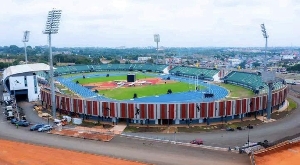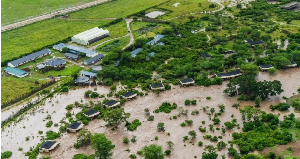- Home - News
- TWI News | TV
- Polls
- Year In Review
- News Archive
- Crime & Punishment
- Politics
- Regional
- Editorial
- Health
- Ghanaians Abroad
- Tabloid
- Africa
- Religion
- Election 2020
- Coronavirus
- News Videos | TV
- Photo Archives
- News Headlines
- Press Release
Opinions of Sunday, 1 May 2005
Columnist: Dankwah, Charles O.
To The Wahala Demonstrators
Recently, the government of Ghana increased the prices of petroleum products to cope with crude oil price increases on the world market. The increases have not been generally accepted by Ghanaian consumers and some politicians have seized this opportunity to incite the masses against the government in a series of marches dubbed ?Wahala Demonstrations?. The purpose of this article is to explain to the general Ghanaian public the world-wide economic upheaval resulting from the recent increases in crude oil prices and its unavoidable effects on the Ghanaian economy. Hopefully, this may cause the Wahala demonstrators and their supporters to re-evaluate their opposition to the recent increases in the prices of petroleum products in Ghana.
On April 1, 2005, someone posed a question on jagtalk.com about petrol prices for international members. Below are the responses. All prices are in US dollars and all volumes are in imperial gallons
Australia $4.67 per gallon
Belgium $8.75 per gallon
England $5.92 per gallon
Finland $8.31 per gallon
Canada (Calgary) $4.41 per gallon
France $7.87 per gallon
USA (Wash. DC) $2.97 per gallon (1 imperial gallon = 1.2 US gallon)
In the USA prices range from $2.35 to $2.55 per US gallon (or $2.88 to $3.06) for 93 Octane fuel, depending on locality. By comparison, the price of petrol in Ghana is about $3.30 per gallon. Why then do we need the Wahala demonstrations?
Considering the fact that the price of crude oil is fairly uniform, the sharp variations in the above prices can only be attributed to the differences in taxes added to the production cost of the petrol. Ghana is not the only or first country to add taxes to petrol prices. Cars, trucks, and most of the other equipment using petrol ply on roads. The government needs money to maintain, repair and upgrade the roads to make our roads safer. Potholes need to be filled before they become death traps. New road networks need to be constructed to facilitate commerce and movement of food from the farms to the consumption areas. Without these taxes where is the government going to find the money to address all these road issues?. Are the human lives that will be saved as a result of improved roads be worth more than the taxes? What will happen if the government drops all the taxes and then neglects the roads because of lack of funds? Ghana is still a developing country and we should not be ashamed or afraid to copy the practices that have helped accelerate development in other countries. Road safety issues affect human lives and we should copy practices that have worked in other areas.
The Wahala Demonstrators continue to make the case that the tax component of petrol cost is too high and the government should consider reducing the taxes. Too high relative to what? I believe this argument has no merit when taken in isolation. The argument should be weighed against the amount of money the government needs to improve the safety of our roads as documented in the budget. If we do not know all the facts it is best to give the government the benefit of doubt. I am of the opinion that the petrol tax in Ghana is very low compared to even the advanced countries listed above. The reason is because Ghana sells petrol at lower prices even though our production costs are higher.
We all know that with every commodity the more you buy the less you pay. We hear of the market prices for crude oil but there are deep discounts that come with large volume purchases. The advanced countries get better discounts because they buy far larger volumes than Ghana. Their transportation cost per gallon is less because they lift their crude oil in super-tankers while Ghana lifts in small tankers. Another issue that increases the cost of refined products in Ghana is that we do not fully utilize the crude oil for local consumption. Crude oil is a mixture of several components. If we can extract and sell all the individual components on the local market it will help to reduce the production cost of petrol. Unfortunately, the refinery in Ghana is only able to extract LP gas, gasoline (petrol), aviation fuel, kerosene and diesel oil. The rest to us is residue which we call fuel oil. This residue is mostly burnt as a very cheap fuel to generate heat for industrial processes. If we have the means, we could go on to process the ?residue? to extract and sell mineral oils, lubricating oils, waxes, road oils, asphalt, and coke at much higher prices. The advanced countries have the means to process crude oil for its full value and we don?t.
The common argument that I have heard is that because of the relatively high pay levels, the citizens in the advanced countries can afford the higher petrol prices. The counter argument is that because of the low pay levels in Ghana, the government has done its best, despite its higher production costs, to keep petrol prices at about $3.30. This price includes the necessary taxes to raise the minimum amount the government needs to improve the safety of our roads and save lives. Ghanaian lives are equally as precious as those in advanced countries and where public safety is an issue it will be irresponsible for the government to make deadly compromises for political gain. Regardless of pay levels, we expect potholes to be filled, asphalt on all trunk roads, bridges to be repaired or constructed where necessary etc. The government must raise as much money as it will take to carry on the road improvements. It is only fair that those who use the roads and bridges pay the taxes that are needed to repair and maintain them.
I believe the current Wahala demonstrations are not in the best interest of Ghana and are politically motivated. The logic here is that with the taxes the government will be able to improve our roads, bridges, and even build new roads. While this is good for Ghana?s development and will save countless lives, it is bad news for the opposition because it will make it harder for them to claim government ineffectiveness in the year 2008 elections. To the opposition, prevention is better than cure. All means must be employed to stop the government from achieving any development regardless of its benefit to Ghanaians. The 2008 election campaign has started!











